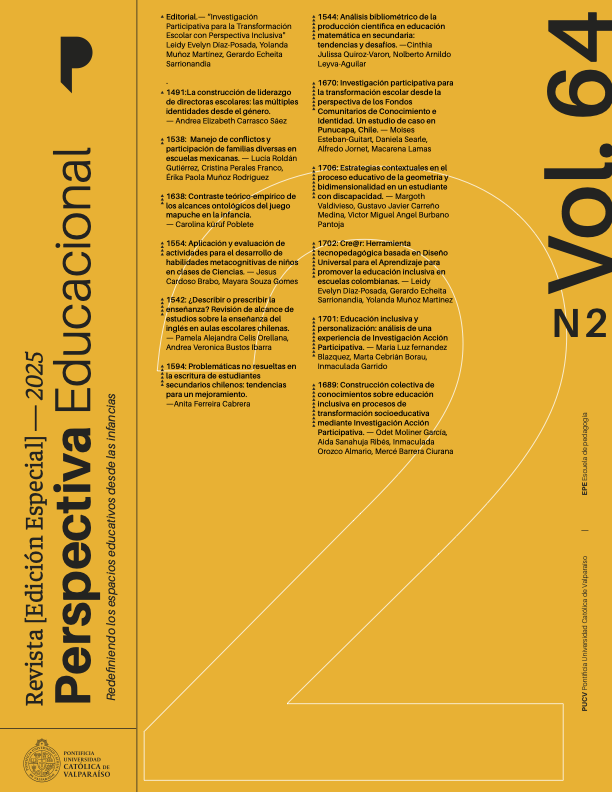Application and Evaluation of Activities for the Development of Metacognitive Skills in Children in Science Classes
DOI:
https://doi.org/10.4151/07189729-Vol.64-Iss.2-Art.1554Keywords:
Metacognition didactic strategies learn to learn primary school natural sciencesAbstract
This paper explores the implementation and assessment of didactic interventions aimed at fostering metacognitive skills in primary school children, particularly in science classes. The study was conducted in rural riverside schools in the northeastern region of Pará, Brazil, focusing on fourth-grade students. The research aimed to investigate the educational benefits of using metacognitive strategies to enhance students' ability to 'learn how to learn' and improve their scientific literacy.
The theoretical framework emphasizes the importance of metacognition, defined as "thinking about one's own thinking," in educational settings. Metacognitive strategies can help students become more aware of their learning processes, thereby improving their ability to monitor, control, and adjust their thinking during tasks. The study builds on previous research suggesting that metacognitive skills are not solely dependent on age but are significantly influenced by education and experience.
The methodology involved the design and implementation of three sets of metacognitive activities: “Reflection Apples”, “Timeline”, and “Learning Thermometer”. These activities were tailored to the regional context and the limited resources available in the rural schools. The activities were conducted over three sessions, each lasting approximately four hours, and involved students in tasks that required them to reflect on their learning, organize information, and evaluate their understanding. Data were collected through ethnographic techniques, including video recordings, audio recordings, and written notes, to capture students' interactions and behaviors during the activities.
The results indicated that the activities successfully engaged students and encouraged them to participate actively in the learning process. The “Reflection Apples” activity, which involved students reflecting on environmental issues, showed that students were able to activate prior knowledge and engage in discussions with peers and teachers. The “Timeline” activity, which required students to organize historical events related to the history of chocolate, demonstrated that students could effectively sequence information and collaborate with their peers. The “Learning Thermometer” activity, which focused on understanding microorganisms, revealed that students were able to self-assess their understanding and seek clarification when needed.
The analysis of the data revealed that students exhibited various metacognitive behaviors, such as monitoring their learning, asking for clarification, and revising their work. However, the study also found that students had limited opportunities to practice higher-order metacognitive skills, such as planning and evaluating their learning strategies. The authors suggest that the lack of these skills may be due to the limited exposure to such practices in traditional classroom settings.
In conclusion, the study highlights the potential of metacognitive activities to create a favorable learning environment, enhance student motivation, and promote the acquisition of metacognitive skills. The authors recommend further research to explore the long-term effects of these activities and to develop more comprehensive strategies for integrating metacognitive practices into primary education. They also emphasize the need for teacher training programs to incorporate metacognitive strategies to improve both student learning outcomes and teaching practices.
Overall, the study contributes to the growing body of research on metacognition in education and provides practical insights into how metacognitive strategies can be effectively implemented in primary school science classes, particularly in resource-limited settings.
References
Assis, E. F., Nogues, C. P., Corso, L. V., Dorneles, B. V., & Corso, H. V. (2021). Relações entre a Compreensão de Leitura, Resolução de Problemas de Raciocínio Quantitativo e Funções Executivas. Ciência & Educação, 27, e21004. https://doi.org/10.1590/1516-731320210004
Bae, H., & Kwon, K. (2019). Developing metacognitive skills through class activities: what makes students use metacognitive skills? Educational Studies, 47(4), 456-471. https://doi.org/10.1080/03055698.2019.1707068.
Baker, L., & Brown, A. (1980). Metacognitive skills and reading. Technical Report nº 188. National Institute of Child Health and Human Development.
Brabo, J. C. (2018). Metacognição, ensino-aprendizagem e formação de professores de ciências. Amazonia: Revista de educação em ciências e matemáticas, 14(29), 1-9. http://dx.doi.org/10.18542/amazrecm.v14i29.5898
Bransford, J., Brown, A., & Cocking, R. (2000). How people learn: brain, mind, experience and school. National Academy Press.
Cardwell, G. S., Cole, P. M., Weaver, B., Leadbeater, J. M., Lunkenheimer, E. S., Buss, K. A., Gatzke-Kopp, L., & Ram, N. (2024). Developmental differences in young children's implied use of cognitive resources in their Self-Regulation strategies. Social Development, e12769. https://doi.org/10.1111/sode.12769
Carretero, M. (2021). Constructivismo y educación. Tilde editora.
Cheruvalath, R., & Gaude, A. R. (2024). Introducing a classroom-based intervention to regulate problem behaviours using metacognitive strategies. European Journal of Psychology of Education, 1-21. https://doi.org/10.1007/s10212-023-00788-0
Dehaene, S. (2020). How we learn. Penguin Books.
Dubey, R., & Griffiths, T. L. (2020). Reconciling novelty and complexity through a rational analysis of curiosity. Psychological Review, 127(3), 455-476. https://doi.org/10.1037/rev0000175
Erickson, F. (1986). Qualitative methods in research on teaching. In M. Wittrock (Ed.), Handbook of research on teaching (3rd ed., 119-161). Macmillan.
Flavell, J. (1979). Metacognition and cognitive monitoring: a new area of cognitive developmental inquiry. American Psychologist, (34), 906-911. https://doi.org/10.1037/0003-066X.34.10.906.
Flavell, J., & Wellman, H. M. (1977). Metamemory. In R. Kail, & W. Hagen (Eds.), Perspectives on the development of memory and cognition (pp. 03-33). Erlbaum.
Gomes, M. S., & Brabo, J. C. (2020). Estimulando a metacognição em classe: estratégias para o ensino e aprendizagem nos anos iniciais. https://educapes.capes.gov.br/handle/capes/574690
Mayring, P. (2021). Qualitative content analysis: a step-by-step guide. Sage.
McGregor, T. (2007). Comprehension connections: brigdes to strategic reading. Heineman.
Mundo-Microbiano. (2018). O que são os microrganismos? [Video]. Youtube. https://youtu.be/CvRiuKrU6jM
Novak, J. D. (2022). Helping People Learn. Cambridge University Press. https://doi.org/10.1017/9781108625982
Oliveira, A. (2023). Etnografia para educadores. Editora de la Unesp.
Santiago, E. (2012). História do chocolate. InfoEscola. https://www.infoescola.com/alimentos/chocolate
Sheffler, P., Rodriguez, T. M., Cheung, C. S., & Wu, R. (2022). Cognitive and metacognitive, motivational, and resource considerations for learning new skills across the lifespan. Wiley Interdisciplinary Reviews: Cognitive Science, 13(2), e1585. https://doi.org/10.1002/wcs.1585
Thomas, G. P. (2023). Instruction for Metacognition in Science Classrooms: Harsh Realities and a Way Forward? In Challenges in Science Education: Global Perspectives for the Future (pp. 251-277). Springer International Publishing. https://doi.org/10.1007/978-3-031-18092-7_12
Veenman, M., van Hout-Wolteurs, B., & Afflerbach, P. (2006). Metacognition and learning: Conceptual and methodological considerations. Metacognition and learning, 1(1), 3-14. https://doi.org/10.1007/s11409-006-6893-0
Vosniadou, S., Bodner, E., Stephenson, H., Jeffries, D., Lawson, M. J., Darmawan, I. N., Kang, S., Graham, L., & Dignath, C. (2024). The promotion of self-regulated learning in the classroom: a theoretical framework and an observation study. Metacognition and Learning, 19, 1-39. https://doi.org/10.1007/s11409-024-09374-1
Whitebread, D., Coltman, P., Pasternak, D. P., Sangster, C., Grau, V., Bingham, S., & Demetriou, D. (2009). The development of two observational tools for assessing metacognition and self-regulated learning in young children. Metacognition and Learning, 4, 63-85. https://doi.org/10.1007/s11409-008-9033-1
Downloads
Published
How to Cite
Issue
Section
License
Copyright (c) 1969 Mayara Souza Gomes, Jesus Cardoso Brabo

This work is licensed under a Creative Commons Attribution-ShareAlike 4.0 International License.
The authors grant an exclusive licence, without time limit, for the manuscript to be published in the Perspectiva Educacional journal, published by the Pontificia Universidad Católica of Valparaíso (Chile), through the School of Pedagogy.





